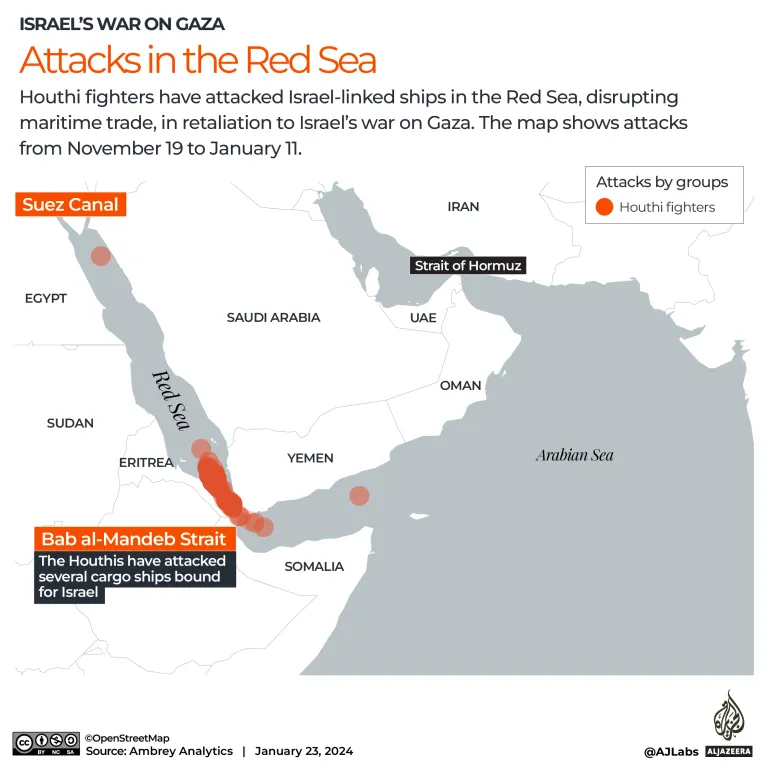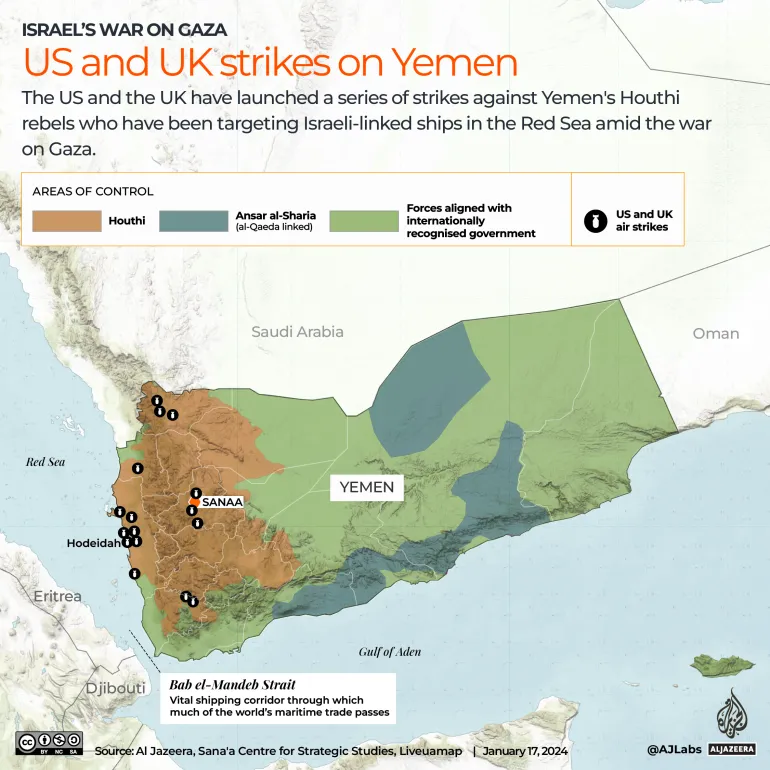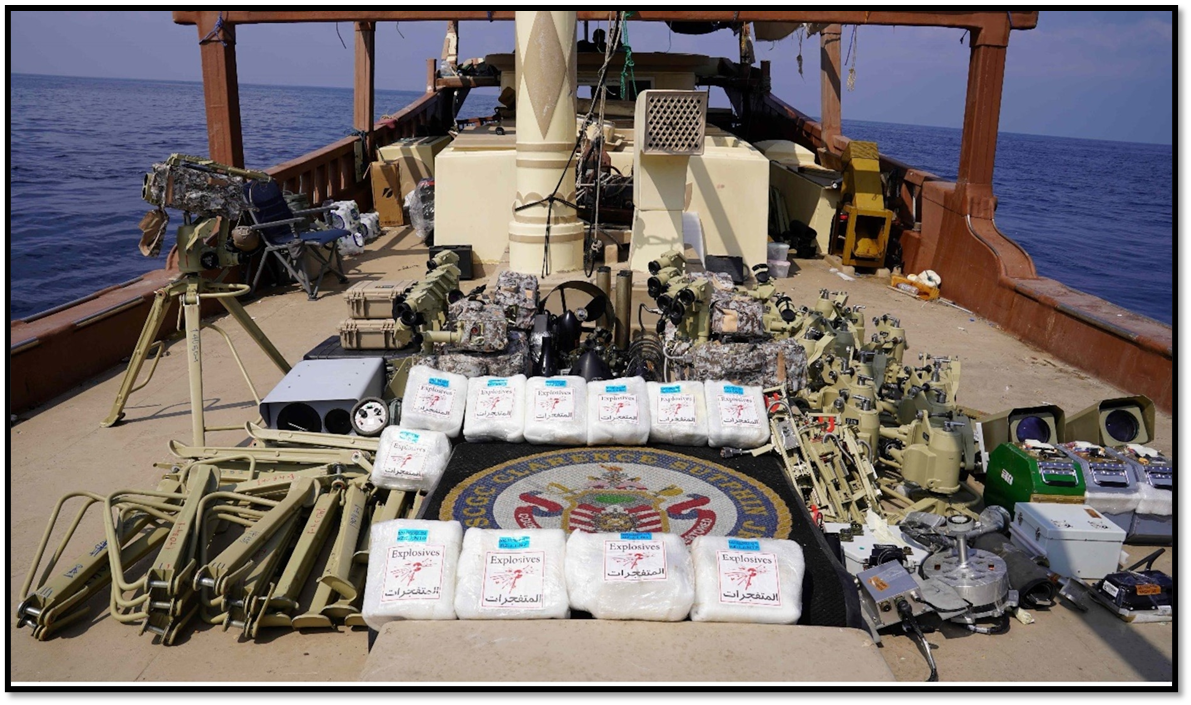What have the Houthis attacked in the Red Sea and Gulf of Aden since the Gaza war began in October 2023?
During the first eight months of the conflict, the Houthis attacked U.S. Navy or commercial vessels more than 190 times, according to the Pentagon. Experts at The Washington Institute for Near East Policy recorded attacks on 80 commercial vessels, mostly in the Red Sea and Gulf of Aden but also in the Arabian Sea and Indian Ocean, during roughly the same period. The Houthis claimed more attacks, but not all could be independently verified. By disrupting shipping in the region, they sought, without success, to pressure Israel to withdraw from Gaza. The attacks significantly boosted the Houthis’ global profile.
Tensions in the Red Sea and the wider region started escalating less than two weeks after the unprecedented October 7 Hamas attack on Israel and subsequent counterassault. On Oct. 19, 2023, the Houthis fired three land-attack cruise missiles and several drones from Yemen toward Israel. The USS Carney intercepted the missiles and drones.
The Houthis then increasingly focused on commercial shipping. They claimed to target vessels on their way to or linked to Israel, but many of the ships did not have known Israeli affiliations. On Nov. 19, 2023, the Houthis seized the Galaxy Leader – a British-owned, Japanese-operated cargo ship – in the Red Sea and took 25 crew members hostage. By late 2023, the Houthis were routinely attacking tankers, cargo ships and the U.S. warships trying to protect them. “We will not hesitate to carry out more operations in retaliation to the Zionist crimes against our brothers in the Gaza Strip,” Yahya Saree, a Houthi spokesperson said in February 2024, “as well as in response to the ongoing American-British aggression against our dear country.”

Most of the Houthi missiles and drones either missed their targets or were intercepted. The Houthis only managed to severely damage a handful of ships. Four civilian sailors had been killed in two fatal attacks as of July 2024.
By mid-2024, more than 65 countries had direct connections to the ships that were attacked, whether through the flagging state, where the goods were produced or destined, or the nationalities of the innocent mariners aboard each vessel, according to the Pentagon. The number of affected parties illustrated the global nature of the threat.
What impact have the attacks had on commercial and military shipping through the strategic waterway?
Before October 2023, 10 to 15 percent of global seaborne trade, including 25 to 30 percent of container traffic, passed through the Suez Canal, which connects the Mediterranean Sea to the Red Sea. The Houthi disruptions led to “increased shipping costs, higher insurance premiums, and rerouting of ships, all of which escalate the cost of global trade,” Fatima Abo Alasrar, a scholar at the Middle East Institute, told The Iran Primer.
By January 2024, container ship, dry bulk carrier and crude oil tanker traffic was down more than 80 percent. Bulk carriers are designed to transport unpackaged cargo, such as grain, coal or cement. Most ships rerouted around Africa’s Cape of Good Hope, which could add 10 or more days to trips from Europe to Asia and up to $1 million in fuel costs. The shifts have further disrupted global supply chains.
Dry bulk carrier traffic through the Suez Canal was still down by about 80 percent in June 2024. Shipping prices for a 40-foot standard container were up 233 percent compared to June 2023. The extended voyage time also strained the supply of available ships. To compensate for the longer distance, ships increased speed, which could increase emissions by 70 percent on the Singapore-Rotterdam route, according to an expert at the U.N. Conference on Trade and Development.
What has the United States done in response?
In December 2023, Washington launched Operation Prosperity Guardian, a coalition of 24 countries with a mandate to protect international shipping. Secretary of Defense Lloyd Austin III said its mission was “to jointly address security challenges in the southern Red Sea and the Gulf of Aden, to ensure freedom of navigation for all countries and bolster regional security and prosperity.”
In January 2024, the United States mobilized Operation Poseidon Archer, a separate coalition willing to conduct offensive operations to degrade Houthi military capabilities. It included Britain, Australia, Canada, Bahrain, and the Netherlands.
U.S. forces in the region included five destroyers – the Thomas Hudner, Gravely, Mason, Laboon and Carney – which often intercepted Houthi projectiles. The Eisenhower became the first U.S. aircraft carrier to enter the Middle East since 2021. The U.S. Navy had not been involved in such heated combat since World War II, according to Vice Adm. Brad Cooper. “When I say engaged in combat, where they're getting shot at, we're getting shot at, and we're shooting back,” he told CBS in February 2024.
By mid-March 2024, U.S. and coalition partner strikes had destroyed “over 150 missiles and launchers, and also storage and support buildings, UAV [unmanned aerial vehicle] storage buildings, communication buildings, underground storage facilities, and UAV ground stations,” according to a Pentagon spokesperson. The United States had some 7,000 sailors in the Red Sea as of June 2024.
How have U.S.-led military operations against the Houthi threat evolved since late 2023? What impact have U.S. airstrikes had?
From late 2023 until March 2024, U.S.-led coalition operations largely fell into three categories: interdictions of vessels smuggling weapons from Iran, self-defensive strikes and deterrent strikes. Self-defense strikes were in response to an imminent threat, including the interception of inbound missiles and drones or hitting missile launchers that were being primed to attack. The coalition also carried out strikes aimed at deterring the Houthis and degrading their ability to hit ships or targets far from the coast. For example, on Jan. 11-12, 2024, the United States and Britain – with support from the Netherlands, Canada, Bahrain, and Australia – launched more than 150 precision-guided munitions strikes on 60 targets in Yemen, including radars, missile and drone launch sites, and weapons storage facilities.

But the rules of engagement changed after two key events, according to Michael Knights, a senior fellow at The Washington Institute for Near East Policy. On March 2, 2024, the British-owned bulk carrier Rubymar sank due to damage from a Houthi anti-ship ballistic missile. And on March 6, the Houthis hit the Liberian-owned bulk carrier True Confidence with an anti-ship ballistic missile. Three crew members were killed in the first fatal Houthi attack on a commercial vessel. From that point onwards, coalition forces started launching preemptive strikes on heavy weapons systems.
U.S. officials, however, did not provide a detailed assessment of the impact on the overall Houthi arsenal. “It’s very clear that we are degrading their capability,” Vice Adm. Cooper told CBS in February 2024. “Every single day they attempt to attack us, we’re eliminating and disrupting them in ways that are meaningful, and I do believe have an impact.” But he also acknowledged that Iran was resupplying the Houthis. That same month, a senior defense official told CNN that the Houthis were continuing to surprise the United States. “We just don’t have a good idea of what they still have.”
Between Oct. 7, 2023 and Jan. 11, 2024, the Houthis received at least four resupply vessels that were each capable of transporting 30 tons of supplies. Boats thought to have come from Iran’s Behshad ship – a vessel stationed in the Red Sea widely presumed to be a spy vessel – also offloaded materiel at the port of Hodeidah for five days in December 2023. In January 2024, however, the Houthis appeared to have changed their resupply methods, according to Knights. They may have broken up shipments into smaller pieces that could be put on fishing boats, or they could have brought larger ships into Hodeidah. Knights warned that one bulk transfer could be equivalent to six months’ worth of smaller transfers.
What other ways has the United States countered the Houthis since October 2023?
U.S. forces have interdicted at least two vessels carrying Iranian weapons to the Houthis since October 2023. On Jan. 11, 2024, U.S. Navy SEALs boarded and seized a dhow off the coast of Somalia that was carrying propulsion, guidance, and warheads for Houthi medium-range ballistic missiles and anti-ship cruise missiles, as well as air defense-associated components. And on Jan. 28, 2024, forces from the U.S. Coast Guard Cutter Clarence Sutphin Jr boarded and seized a ship in the Arabian Sea transporting ballistic missile components, explosive, unmanned underwater vehicle and unmanned surface vehicle components, military communication equipment, and anti-tank guided missile components.

In January 2024, the White House announced that the Houthis would be redesignated as Specially Designated Global Terrorists (SDGT), effective February 16. The United States sought to “promote accountability for the group’s terrorist activities,” Secretary of State Antony Blinken said. “If the Houthis cease their attacks in the Red Sea and Gulf of Aden, the United States will reevaluate this designation.” The United States has also imposed sanctions on four Houthi officials and dozens of companies, financiers, ships that provided support to the group.
What have the Houthis gained from their attacks on commercial shipping, the U.S.-led coalition vessels, and Israel?
The Houthis have bolstered their domestic and regional standing by launching attacks in solidarity with the Palestinians. The Houthis “have been waging what amounts to an information campaign,” Alexandra Stark, a researcher at the RAND Corporation, told The Iran Primer. “While the attacks of course have material consequences, from the Houthis’ perspective, what likely matters most is getting their message across, efforts that have largely been successful.”
Professor Thomas Juneau at the University Ottawa noted that the Houthis, despite their dominant military position in Yemen, were “vulnerable politically” at home, in part because of their economic mismanagement before October 2023. But the public’s virtually unanimous support for the Palestinian cause has diffused criticism.
Abo Alasrar, the scholar at the Middle East Institute, agreed that the Houthis had gained public legitimacy by “portraying themselves as defenders of Yemeni sovereignty and Islamic values against foreign aggressors.” She added that the public alignment with Iran helped the Houthis “maintain morale and cohesion within their ranks, reinforcing their image as a formidable and enduring force in Yemen's ongoing conflict.”
Indeed, senior leaders in Tehran have lauded the Houthis. “What [the Houthis] have done in support of the people of Gaza is truly worthy of praise,” Supreme Leader Ayatollah Ali Khamenei said on Jan. 16, 2024. “We hope, God willing, these efforts, acts of resistance and activities will continue until victory.”
The Houthis have exploited the conflict by ramping up recruitment efforts. In February 2024, a Houthi spokesperson claimed that the group had recruited 200,000 new fighters since launching operations in the Red Sea. Experts thought the number may be closer to 170,000 or 150,000. Human Rights Watch reported that hundreds if not thousands of the new fighters were minors. The United Nations has documented child recruitment by the Houthis as early as 2010.
The Houthis have also benefited on the international stage in three major ways. First, Knights said, they have enhanced their status by proving their utility within the “Axis of Resistance,” a network of Iranian allies in Lebanon, Iraq, Syria, Bahrain, and the Palestinian Territories. “They’re not a bunch of people who wear sandals and live in caves anymore.” Second, “they have gone toe to toe with the United States and not backed off, which has earned them enormous prestige, including within Yemen. And third, “they've gone toe to toe with Israel and not backed off, which also earned them enormous prestige.”
